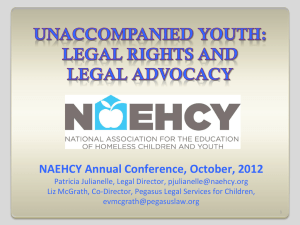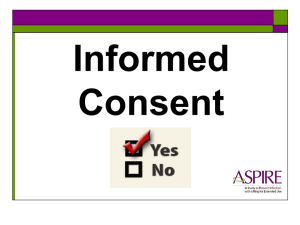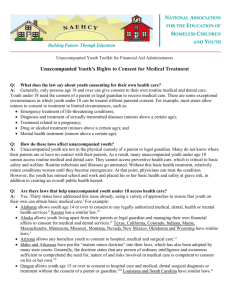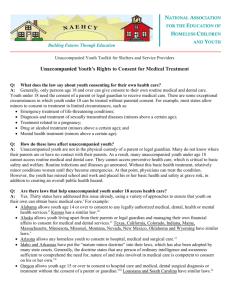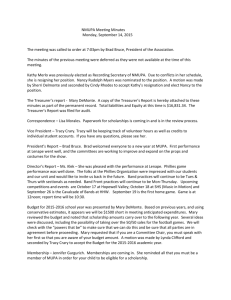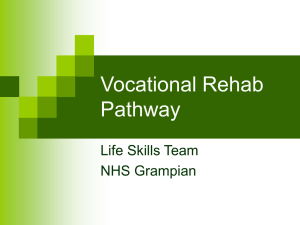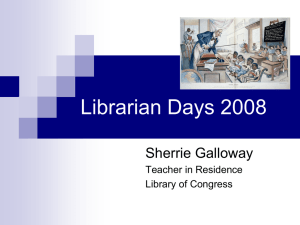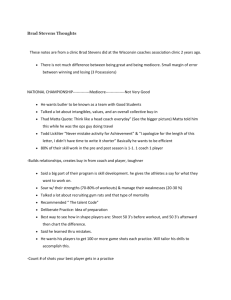presentation - School of Education
advertisement
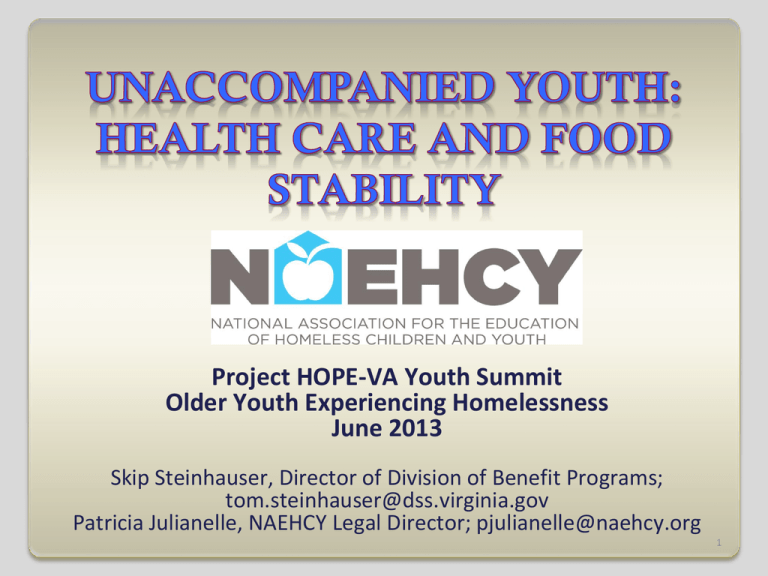
Project HOPE-VA Youth Summit Older Youth Experiencing Homelessness June 2013 Skip Steinhauser, Director of Division of Benefit Programs; tom.steinhauser@dss.virginia.gov Patricia Julianelle, NAEHCY Legal Director; pjulianelle@naehcy.org 1 Minors’ access to health care Brad is a high school junior. He recently moved into a shelter after his parents kicked him out of the house. He has no contact with his parents, but it is not clear why they abandoned him. Brad gets bullied at school and needs some mental health support. The swim team is his life line. But in order to keep swimming, he needs an updated physical and a Hepatitis B vaccine. 2 Brad Can Brad consent for a physical? Can his case manager at the shelter? Strategies to help Brad access medical care? Strategies to help Brad access mental health care? 3 Can the coach consent to the physical? Can Brad? What about mental health? Generally, only persons age 18 and over can consent to their own medical, dental, and health care; minors need consent of a parent or guardian. State law (54.1-2969) provides exceptions, including: Emergency treatment (with the consent of the minor if 14 or older) Outpatient mental health and substance abuse treatment Birth control, family planning and pregnancy related care (not including abortion) and care of the youth’s child Care for infectious and sexually-transmitted diseases Married and emancipated youth can consent Any person standing “in loco parentis” can consent 4 Medical and mental health consent (cont.) Many states have general exceptions that apply to unaccompanied youth Over a minimum age of 14 or 15 (AL, KS, OR, LA, SC) Youth living apart from their parents/guardians and managing their own financial affairs (CA, CO, IN, ME, MD, MA, MN, MO, MT, NV, NM, OK, TX, WY) Any homeless youth (AZ) Mature minor doctrine: any person of ordinary intelligence and awareness sufficient to comprehend the need for, nature of and risks involved in medical care is competent to consent (ID, AR, courts) 5 But what can we do in Virginia? Does Brad have a recent physical from a previous school or health care provider? Is the case manager in loco parentis? Can we get a parent sign a health care power of attorney? Can we get phone consent from a parent? Health care for the Homeless providers or other specialty clinics Advocacy from the case manager, liaison or other adult 6 Food security for unaccompanied youth There is no age minimum for SNAP; No parent signature is required; and SNAP cannot be denied due to lack of address or photo ID. SNAP eligibility is based on the “household”: people who customarily purchase and prepare food together. Youth who purchase and prepare their own food are their own household, if no one is exercising “parental control”. 7 Beware… It’s important for youth and the people they are staying with to talk about SNAP and how the youth’s application could affect the household. What happens when parents keep the youth on the parents’ application? What can youth do if they are denied benefits due to an illegal reason, like age? 8 Other food resources Free school meals: homeless students are automatically eligible and guidance is forthcoming Food banks: Will they set aside ready-to-eat food items? Will they give food to minors? Soup kitchens: Are they youth-friendly? Weekend food boxes http://center.serve.org/nche/downloads/brie fs/nutrition.pdf 9 Social Security Survivor Benefits Social Security Survivor benefits are based on a parent’s contributions to Social Security if: 1. The parent is disabled or retired and entitled to Social Security benefits, or 2. The parent died after having worked long enough in a job where he or she paid Social Security taxes Unmarried youth are eligible to age 18, and up to 19 if a full-time high school student Even if not living with guardian 10 Can youth get SS Survivor Benefits in their own name? Yes! Prior to 18th birthday, direct payments can be made to a youth if the youth is: Living alone and supporting himself or herself Capable of using the benefits to provide for his or her current needs and no qualified payee is available Within 7 months of attaining age 18 and is initially filing an application for benefits Other categories, as well Benefits automatically transfer to youth on 18th birthday NAEHCY Unaccompanied Youth Toolkit 11 What about SSI? Monthly cash payment to individuals with disabilities and limited income. Automatic Medicaid eligibility. Parents’ or guardians’ income counts only if the youth lives with his or her parents. Youth 16-18 may sign their own applications, if they: are mentally competent have no court appointed representative, and are not in the care of another person or institution. For youth under age 16, a court appointed representative, person caring for the youth, or manager of an institution where the youth is residing may sign the application. 12 Additional Resources National Association for the Education of Homeless Children and Youth www.naehcy.org www.naehcy.org/educational-resources/youth National Center for Homeless Education www.serve.org/nche; 1-800-308-2145 National Network for Youth www.nn4youth.org National Runaway Safeline www.1800runaway.org; 1-800-621-4000 13

